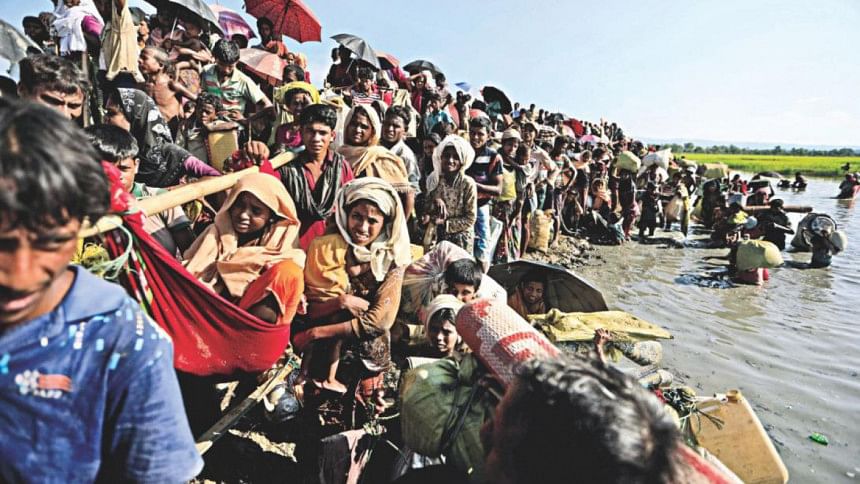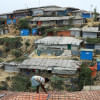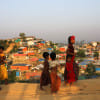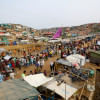Could've been handled better

Myanmar leader Aung San Suu Kyi has said that, with hindsight, her government could have better handled the situation in Rakhine state that led to the forced displacement of more than 700,000 Rohingya Muslims.
Speaking at the World Economic Forum (WEF) in Vietnam yesterday, Suu Kyi said her government had attempted to ensure "development and rule of law" in the far western state.
"There are of course ways in which we, with hindsight, might think that the situation could have been handled better," she said to Borge Brende, WEF President.
Read more: Rohingya crisis: The other face of today's humanity
"But we believe that for the sake of long-term stability and security we have to be fair to all sides. The rule of law must apply to everybody. We cannot choose and pick whom should be protected by rule of law," she said.
Hundreds of thousands of Rohingya were forced to flee Rakhine into neighbouring Bangladesh following a violent government crackdown in August last year, precipitating one of Asia's worst refugee crisis.
Many of those who crossed the border have recounted horrific stories of being driven from their homes under threat of death.
An independent United Nations investigation into alleged human rights abuses carried out against the Rohingya has called for Myanmar's military leaders to be investigated and prosecuted for genocide, crimes against humanity and war crimes.
Myanmar's military has repeatedly denied that it has deliberately attacked unarmed Rohingya.
Suu Kyi was also asked about the two Reuters journalists who were jailed earlier this month for seven years after being found guilty of breaching the country's Official Secrets Act, for their part in uncovering a massacre of Rohingya Muslims in Rakhine.
In her first public comments since the pair were found guilty, Suu Kyi said the two men, Wa Lone, 32, and Kyaw Soe Oo, 28, "were not jailed because they were journalists" but for breaking the country's colonial-era Official Secrets Act.
"I wonder whether very many people have actually read the summary of the judgment which had nothing to do with freedom of expression at all, it had to do with the Official Secrets Act. But I don't think anybody has actually bothered to read it," she said, adding the two men were free to appeal the judgment.
MOUNTING CRITICISM
Suu Kyi has faced intense criticism for her role in the crisis and the jailing of the two Reuters journalists, with international bodies calling for the Nobel Peace laureate to be stripped of the honour.
UN investigators into the Rohingya crisis found that Myanmar's civilian government had "contributed to the commission of atrocity crimes" through their "acts and omissions."
"The State Counsellor, Daw Aung San Suu Kyi, has not used her de facto position as Head of Government, nor her moral authority, to stem or prevent the unfolding events in Rakhine State," states the report, which was released earlier this month.
The International Criminal Court has said it has jurisdiction to open an investigation, even though Myanmar is not a member of the tribunal.
Suu Kyi said her government had to accept responsibility for the situation, despite "only having 75% of power, we have to accept 100% of the responsibility. That's what elected government is all about," she said yesterday, in reference to her government's power sharing arrangement with the country's military chiefs.
The Myanmar state councillor told the WEF President the planned repatriation of hundreds of thousands of Rohingya was on hold until the refugees agree to return. "We cannot go fetch them from Bangladesh," she said.
'POINT IT OUT'
The plight of the two Reuters journalists has attracted worldwide attention, with US Vice President Mike Pence calling on the Myanmar government to free the pair, saying instead of being imprisoned they should be "commended."
"Freedom of religion & freedom of the press are essential to a strong democracy," Pence wrote in a post on Twitter.
The EU's diplomatic chief yesterday condemned Myanmar's jailing of two journalists.
"Many observers saw this trial as a test of freedom of the media, democracy and the rule of law in the country. It is pretty clear that the test was failed," Federica Mogherini told the European Parliament.
She repeated a call for the reporters' immediate, unconditional release, saying they had not had a fair trial, reported AFP.
The two men were originally detained in December 2017 after working on an investigation on the mass killing of a number of Rohingya villagers in Myanmar's Rakhine state, reported CNN Online.
Reuters stands by the reporters and the investigation, which included photographic evidence of the massacre.
Following their jailing, the wives of the two journalists made an impassioned plea for their husbands' freedom, who they maintain are innocent.
"We admire (Suu Kyi) a lot -- me, Wa Lone, the family -- we feel really sad that the leader that we admire is misunderstanding us," journalist Wa Lone's wife, Pan El Mon, told reporters.
But Suu Kyi yesterday challenged anyone who had a problem with the judgment against two Reuters journalists to point out the error to her.
"The case has been held in open court, and all the hearings have been open to everybody who wished to go and attend them, and if anybody feels that there has been a miscarriage of justice, I would like them to point it out," she said.

 For all latest news, follow The Daily Star's Google News channel.
For all latest news, follow The Daily Star's Google News channel. 







Comments